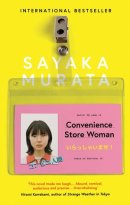 Synopsis from Goodreads
Synopsis from Goodreads
Keiko Furukura had always been considered a strange child, and her parents always worried how she would get on in the real world, so when she takes on a job in a convenience store while at university, they are delighted for her. For her part, in the convenience store she finds a predictable world mandated by the store manual, which dictates how the workers should act and what they should say, and she copies her coworkers’ style of dress and speech patterns so she can play the part of a normal person. However, eighteen years later, at age 36, she is still in the same job, has never had a boyfriend, and has only few friends. She feels comfortable in her life but is aware that she is not living up to society’s expectations and causing her family to worry about her. When a similarly alienated but cynical and bitter young man comes to work in the store, he will upset Keiko’s contented stasis–but will it be for the better?
My Thoughts
This is a very short, simple story about a woman that has spent her entire adult life focused on her job in a convenience store. Here are my pros and cons:
Pros
- I found myself feeling proud of Keiko. Despite what others expected of her, she found a place for herself where she was comfortable and able to excel.
- Interesting look at Japanese convenience stores. I have had the good fortune to travel to Tokyo and Yokohama and I will say that the Japanese idea of a convenience store is quite different from an American one.
Cons
- I had a little trouble with some of the dialogue. It felt choppy and terse. I think a few things probably got lost in translation.
- For such a short book (163 pages) it felt a bit long to me. Not much actually happens and there are several areas of the story where concepts and activities are repeated. It feel the story might have been a little more enjoyable if it had been even more succinct.
- I believe we are supposed to understand that Keiko is autistic, or at least on the spectrum, but the author never actually comes out and says that. So I wasn’t really sure if the author was trying to make some kind of social statement or not. Was the book written to show how an autistic person can be perfectly happy and able to live a full and functioning life, despite what others think? Was the book written to make the reader understand that it is okay for someone to be content with what is considered a low or demeaning job by others? Was this a diatribe against the expectation for everyone to excel in the Asian cultures? Was it something else entirely or possibly nothing at all? I felt a little confused about the book’s purpose and I think that clouded my opinion of the book a bit.
Keiko was happy in the convenience store. The store had structure and rules and she understood how to be “normal” there. It was essentially her home… she lived to work at the convenience store. She also wasn’t dependent upon anyone and she wasn’t hurting anyone by her choices. Ultimately, to me, this was a story about living the life you want to live… and Keiko lived her life exactly how she wanted and needed to live it.
Originally published in 2016 by Bungeishunjū. An English-language translation by Ginny Tapley Takemori was released by Grove Press (US) and Portobello Books (UK) in 2018.
My rating – 3 out of 5
If you are interested in purchasing this book please consider clicking the image below. As an Amazon Associate I earn from qualifying purchases. Thanks!



This sounds like a pretty interesting read.
LikeLiked by 1 person
It was unusual and different. Definitely short enough for a quick read. Give it a shot and let me know what you think! 🙂
LikeLiked by 1 person
I liked this one as it kept me asking questions… there could be different meanings in it.
LikeLiked by 1 person
Very true! Everyone will probably get something different from the story. I’m glad you liked the book! 🤗
LikeLiked by 1 person
This one has been on my TBR so I’m glad to find your review!
LikeLiked by 1 person
Hope you enjoy it! 🤗
LikeLike
Your thoughts are really interesting, this is a great review, having read this and loved it I do agree with you that the book didn’t seem to have a clear ‘purpose’. Oddly enough I found that part of the appeal, I like that I could find my own interpretation of Keiko’s life and the social commentary the book offers!
LikeLiked by 1 person
Thanks for your comments! I tend to agree – I think we were supposed to interpret it in our own way. So ultimately everyone could perceive the story differently. How awesome is that?! 🤗
LikeLike